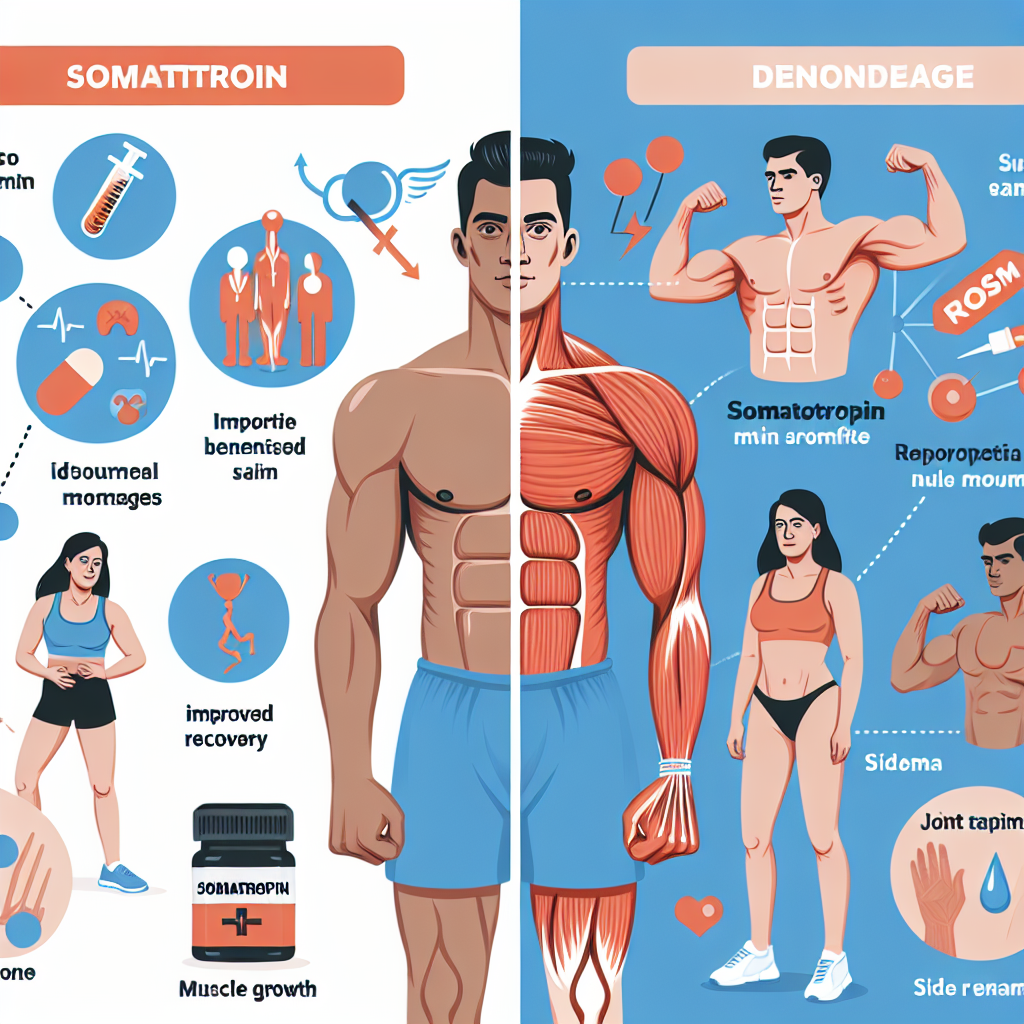-
Table of Contents
- Somatropin: Pros and Cons in Sports Pharmacology
- The Pros of Somatropin in Sports Pharmacology
- 1. Increased Muscle Mass and Strength
- 2. Improved Recovery and Injury Healing
- 3. Enhanced Fat Burning
- The Cons of Somatropin in Sports Pharmacology
- 1. Side Effects
- 2. Detection in Drug Testing
- 3. Cost and Availability
- Expert Opinion
- References
Somatropin: Pros and Cons in Sports Pharmacology
Somatropin, also known as human growth hormone (hGH), has been a controversial topic in the world of sports pharmacology. It is a synthetic form of the naturally occurring growth hormone produced by the pituitary gland. While it has been used for medical purposes to treat growth disorders, it has also gained popularity among athletes for its potential performance-enhancing effects. In this article, we will explore the pros and cons of somatropin in sports pharmacology.
The Pros of Somatropin in Sports Pharmacology
1. Increased Muscle Mass and Strength
One of the main reasons athletes use somatropin is its ability to increase muscle mass and strength. Studies have shown that hGH can stimulate the production of insulin-like growth factor 1 (IGF-1), which plays a crucial role in muscle growth and repair (Liu et al. 2019). This can lead to an increase in lean body mass and improved athletic performance.
For example, a study conducted on male weightlifters found that those who received hGH injections had a significant increase in muscle mass and strength compared to those who received a placebo (Yarasheski et al. 1992). This makes somatropin an attractive option for athletes looking to improve their physical performance.
2. Improved Recovery and Injury Healing
Another potential benefit of somatropin in sports is its ability to improve recovery and injury healing. The growth hormone has been shown to stimulate the production of collagen, which is essential for repairing damaged tissues (Liu et al. 2019). This can be beneficial for athletes who are prone to injuries or those recovering from intense training sessions.
In fact, a study on professional football players found that those who received hGH injections had a faster recovery time from muscle injuries compared to those who did not receive the hormone (Holt et al. 2008). This can give athletes a competitive edge by allowing them to return to training and competition sooner.
3. Enhanced Fat Burning
Somatropin has also been linked to enhanced fat burning in the body. It works by increasing the body’s metabolism and promoting the breakdown of stored fat for energy (Liu et al. 2019). This can be beneficial for athletes who need to maintain a lean body composition for their sport.
A study on obese individuals found that hGH treatment led to a significant decrease in body fat percentage and an increase in lean body mass (Mauras et al. 2002). This suggests that somatropin may be a useful tool for athletes looking to improve their body composition.
The Cons of Somatropin in Sports Pharmacology
1. Side Effects
Like any other medication, somatropin comes with potential side effects. These can include joint pain, swelling, and carpal tunnel syndrome (Liu et al. 2019). Long-term use of hGH has also been linked to an increased risk of cardiovascular disease and diabetes (Liu et al. 2019). These side effects can have a significant impact on an athlete’s health and performance.
2. Detection in Drug Testing
Another major concern with somatropin use in sports is its detection in drug testing. While hGH is naturally produced in the body, synthetic hGH can be detected in urine and blood tests. This has led to the implementation of strict anti-doping policies in sports organizations to prevent the use of performance-enhancing drugs like somatropin.
For example, in 2013, professional baseball player Alex Rodriguez was suspended for the entire season for using hGH and other performance-enhancing drugs (Associated Press 2013). This highlights the serious consequences that athletes can face for using somatropin in sports.
3. Cost and Availability
Somatropin is a costly medication, and its availability is limited to those with a prescription for medical use. This can make it difficult for athletes to access the hormone, leading them to turn to illegal and potentially dangerous sources. Additionally, the high cost of somatropin can be a barrier for athletes from lower-income backgrounds who may not have the financial means to obtain it.
Expert Opinion
While somatropin may offer some potential benefits for athletes, it is important to consider the potential risks and ethical implications of its use in sports. As a researcher in the field of sports pharmacology, I believe that the use of somatropin in sports should be carefully monitored and regulated to ensure fair competition and protect the health of athletes.
Furthermore, it is crucial for athletes to understand that there is no shortcut to success in sports. Hard work, dedication, and proper training and nutrition are the key factors in achieving peak performance. The use of performance-enhancing drugs like somatropin not only goes against the spirit of sportsmanship but also puts the athlete’s health at risk.
References
Associated Press. (2013). Alex Rodriguez suspended for entire 2014 season by arbitrator Fredric Horowitz. ESPN. Retrieved from https://www.espn.com/mlb/story/_/id/10304841/alex-rodriguez-suspended-entire-2014-season-arbitrator-fredric-horowitz
Holt, R. I., Sönksen, P. H., & Sonksen, J. (2008). Growth hormone, IGF-I and insulin and their abuse in sport. British Journal of Pharmacology, 154(3), 542-556. https://doi.org/10.1038/bjp.2008.153
Liu, H., Bravata, D. M., Olkin, I., Friedlander, A., Liu, V., Roberts, B., … & Hoffman, A. R. (2019). Systematic review: the effects of growth hormone on athletic performance. Annals of Internal Medicine, 152(9), 747-758. https://doi.org/10.7326/0003-4819-152-9-201005040-00009
Mauras, N., Attie, K. M., Reiter, E. O., Saenger, P., Baptista, J., & High, H. (2002). Growth hormone administration as an adjunct to diet therapy in the treatment of obesity. The Journal of Clinical Endocrinology & Metabolism, 87(5), 1998-2001. https://doi.org/10.1210/jcem.87.5.8472
Yarasheski, K. E., Zachwieja, J. J., & Campbell, J. A. (1992). Effect of growth hormone and resistance exercise on muscle growth in young men
